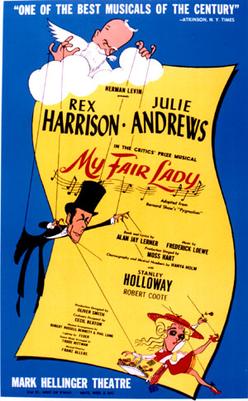
My Fair Lady is a musical with a book and lyrics by Alan Jay Lerner and music by Frederick Loewe. The story, based on George Bernard Shaw's 1913 play Pygmalion and on the 1938 film adaptation of the play, concerns Eliza Doolittle, a Cockney flower girl who takes speech lessons from professor Henry Higgins, a phonetician, so that she may pass as a lady. Despite his cynical nature and difficulty understanding women, Higgins grows attached to her.

Henry Jaynes Fonda was an American actor whose career spanned five decades on Broadway and in Hollywood. On screen and stage, he often portrayed characters who embodied an everyman image.
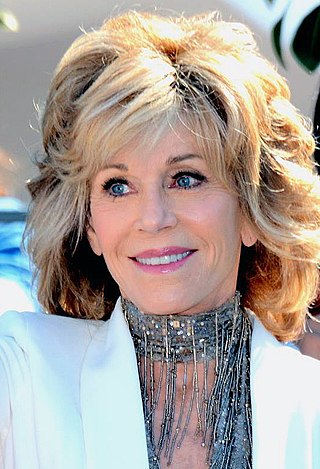
Jane Seymour Fonda is an American actress and activist. Recognized as a film icon, Fonda's work spans several genres and over six decades of film and television. She is the recipient of numerous accolades, including two Academy Awards, two British Academy Film Awards, seven Golden Globe Awards, and a Primetime Emmy Award as well as nominations for a Grammy Award and two Tony Awards. Fonda also received the Honorary Palme d'Or in 2007, the AFI Life Achievement Award in 2014, the Golden Lion for Lifetime Achievement in 2018, the Cecil B. DeMille Award in 2021, and the Screen Actors Guild Life Achievement Award in 2024.
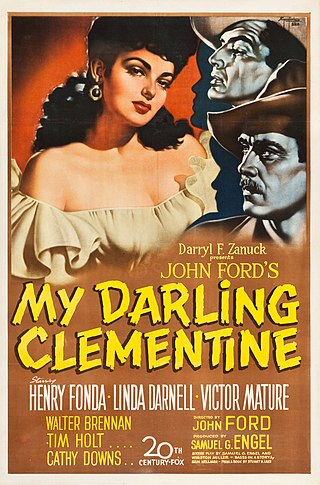
My Darling Clementine is a 1946 American Western film directed by John Ford and starring Henry Fonda as Wyatt Earp during the period leading up to the gunfight at the O.K. Corral. The ensemble cast also features Victor Mature, Linda Darnell, Walter Brennan, Tim Holt, Cathy Downs and Ward Bond.

Scarlet Street is a 1945 American film noir directed by Fritz Lang. The screenplay concerns two criminals who take advantage of a middle-aged painter in order to steal his artwork. The film is based on the French novel La Chienne by Georges de La Fouchardière, which had been previously dramatized on stage by André Mouëzy-Éon, and cinematically as La Chienne (1931) by director Jean Renoir.

Margaret Brooke Sullavan was an American stage and film actress.
Hobson's Choice is a play by Harold Brighouse, the title taken from the popular expression, Hobson's choice—meaning no choice at all.

Joan Geraldine Bennett was an American stage, film, and television actress, one of three acting sisters from a show-business family. Beginning her career on the stage, Bennett appeared in more than 70 films from the era of silent films, well into the sound era. She is best remembered for her film noir femme fatale roles in director Fritz Lang's films—including Man Hunt (1941), The Woman in the Window (1944), and Scarlet Street (1945)—and for her television role as matriarch Elizabeth Collins Stoddard in the gothic 1960s soap opera Dark Shadows, for which she received an Emmy nomination in 1968.
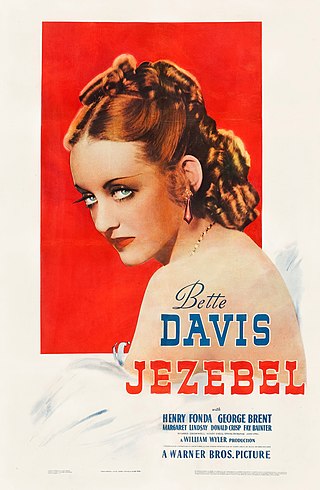
Jezebel is a 1938 American romantic drama film released by Warner Bros. and directed by William Wyler.
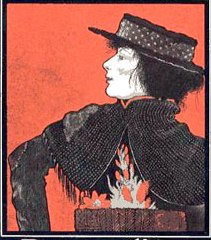
Pygmalion is a play by Irish playwright George Bernard Shaw, named after the Greek mythological figure. It premiered at the Hofburg Theatre in Vienna on 16 October 1913 and was first presented on stage in German. Its English-language premiere took place at His Majesty's Theatre in London's West End in April 1914 and starred Herbert Beerbohm Tree as phonetics professor Henry Higgins and Mrs Patrick Campbell as Cockney flower-girl Eliza Doolittle.
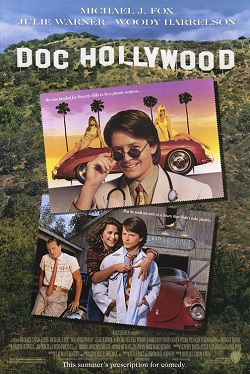
Doc Hollywood is a 1991 American romantic comedy film directed by Michael Caton-Jones and written by Daniel Pyne along with Jeffrey Price and Peter S. Seaman, based on Neil B. Shulman's book What? Dead...Again? The film stars Michael J. Fox, Julie Warner, Barnard Hughes, Woody Harrelson, David Ogden Stiers, Frances Sternhagen, and Bridget Fonda.

Kid Millions is a 1934 American musical film directed by Roy Del Ruth, produced by Samuel Goldwyn Productions, and starring Eddie Cantor. Its elaborate "Ice Cream Fantasy Finale" production number was filmed in three-strip Technicolor, one of the earliest uses of that process in a feature-length film.
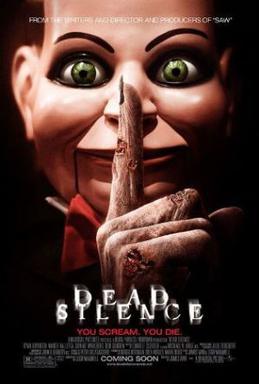
Dead Silence is a 2007 American supernatural horror film directed by James Wan and written by Leigh Whannell. The film stars Ryan Kwanten as Jamie Ashen, a young widower returning to his hometown to search for answers to his wife's death. It also stars Amber Valletta, Donnie Wahlberg, and Bob Gunton.

Jasper "Jax" Jacks is a fictional character from General Hospital, an American soap opera on the ABC network. He has been portrayed mainly by actor Ingo Rademacher since 1996. The role was temporarily played by Gideon Emery during Rademacher's absence from the show in January 2008. The character gained popularity due to a love triangle storyline involving him and supercouple Sonny Corinthos and Brenda Barrett. When Brenda left the show, the love triangle was continued with Sonny and Carly Benson.
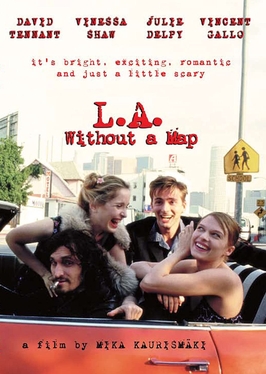
L.A. Without a Map is a 1998 romantic comedy-drama film directed by Mika Kaurismäki, from a screenplay he co-wrote with Richard Rayner, based on Rayner's 1988 semi-autobiographical novel Los Angeles Without a Map. The film stars David Tennant, Vinessa Shaw, Julie Delpy and Vincent Gallo, with Cameron Bancroft and Joe Dallesandro. It is an international co-production between France, the United Kingdom, Finland and Luxembourg.
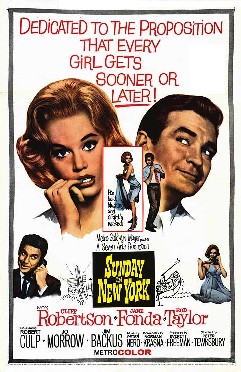
Sunday in New York is a 1963 American romantic comedy film directed by Peter Tewksbury from a screenplay by Norman Krasna, based on Krasna's 1961 play of the same name. Filmed in Metrocolor, the film stars Cliff Robertson, Jane Fonda, and Rod Taylor, with Robert Culp, Jo Morrow, and Jim Backus. The score was composed and recorded by Peter Nero, who also appears as himself performing in a nightclub; Mel Tormé sang the title song.

The House Across the Bay is a 1940 film directed by Archie Mayo, starring George Raft and Joan Bennett, produced by Walter Wanger, written by Myles Connolly and Kathryn Scola, and released by United Artists. The supporting cast features Lloyd Nolan, Walter Pidgeon and Gladys George.

Twin Beds is a 1942 American comedy film directed by Tim Whelan, and starring by George Brent and Joan Bennett. It was distributed by United Artists. The screenplay was written by Kenneth Earl, Curtis Kenyon and Eddie Moran, based on the play of the same name by Salisbury Field and Margaret Mayo.

Marry Me! is a 1949 British comedy film directed by Terence Fisher, and starring Derek Bond, Susan Shaw, Patrick Holt, Carol Marsh and David Tomlinson.
Two for the Seesaw is a three-act, two-person play written by William Gibson. The play opened on Broadway on January 16, 1958, at the Booth Theatre in New York and ran for 750 performances, closing on October 31, 1959. With the opening cast of Henry Fonda and Anne Bancroft, the play was directed by Arthur Penn and produced by Fred Coe. A surprise hit, Two for the Seesaw earned Anne Bancroft, making her Broadway debut, her first Tony Award for Best Featured Actress in a Play. The play was adapted into a film of the same name in 1962, directed by Robert Wise and starring Robert Mitchum and Shirley MacLaine, and was later adapted into the musical Seesaw in 1973. The play marked the Broadway debut of writer William Gibson, who would later collaborate with Penn and Coe on the play and film adaptations of The Miracle Worker, which also featured Bancroft in the lead role.


















